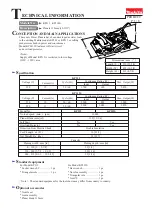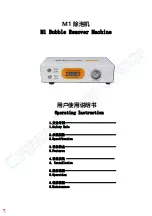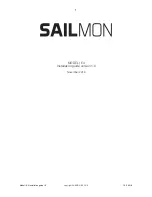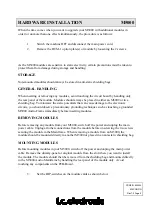
Wear a protective respiratory mask if noxious samples or dispersants are being
handled, particularly in their dry state during sample preparation or measurement.
Do not smoke during measurement procedures, particularly where inflammable
samples or dispersants are used or stored.
Do not eat or drink during measurement procedures, particularly where
poisonous samples or dispersants are used or stored.
Wear protective gloves when handling hazardous materials, or those that cause
skin infections or irritations.
Take care when handling glass (e.g. beakers). Hazardous materials may enter a
wound caused by broken glass.
Use of the Accessory involves the use of a flow cell. Always replace tubing and
“O” rings with items of an equivalent or better specification in order to retain
chemical compatibility, see Appendix B.
Always test a new sample or dispersant for chemical compatibility before use.
Appendix B of this manual provides a list of the material in contact with the
sample and dispersant.
After measuring hazardous samples or dispersants, scrupulously clean the system
(including Dispersion Unit) to remove any contaminants before making another
measurement.
Always label samples for analysis using industry standard labeling, particularly if
they are handled by a number of staff or stored for long periods. Clearly mark any
operator hazard and associated safety precautions that are required for the
handling of dangerous materials. It is important to keep a record of all hazardous
substances used in the instrument for protection of service and maintenance
personnel.
Always adopt responsible procedures for the disposal of waste dispersant and
sample mixtures. Many chemicals are forbidden by law to be disposed of in such a
manner as to allow their entry into the water system. The user is advised to seek
local advice as to the means available for disposal of chemical wastes in the area of
use. Recommendations can be found within the Materials Safety Data Sheets.
The surfaces of the Mastersizer system and Accessory may be permanently
damaged if samples or dispersants are spilt onto them. If spillages should occur
then the system should be disconnected from the power supply before
scrupulously cleaning up the spillage.
C H A P T E R 2
Q S S m a l l V o l u m e S a m p l e D i s p e r s i o n U n i t
P a g e 2 . 4
M A N
0 1 6 1
Summary of Contents for Mastersizer X
Page 7: ...C H A P T E R 1 Introduction to this manual Introduction to this manual...
Page 8: ......
Page 15: ...C H A P T E R 2 Health and safety Health and safety...
Page 16: ......
Page 23: ...C H A P T E R 3 Installation Installation...
Page 24: ......
Page 35: ...C H A P T E R 4 Getting to know your Dispersion Unit Getting to know your Dispersion Unit...
Page 36: ......
Page 43: ...C H A P T E R 5 How the Accessory works How the Accessory works...
Page 44: ......
Page 50: ......
Page 53: ...C H A P T E R 7 Creating changing SOP s Creating changing SOP s...
Page 54: ......
Page 61: ...C H A P T E R 8 Sample preparation Sample preparation...
Page 62: ......
Page 65: ...C H A P T E R 9 Maintenance Maintenance...
Page 66: ......
Page 75: ...A P P E N D I X A Specification Specification...
Page 76: ......
Page 79: ...A P P E N D I X B Chemical compatibility Chemical compatibility...
Page 80: ......
Page 83: ...A P P E N D I X C Simple fault finding Simple fault finding...
Page 84: ......
Page 87: ...A P P E N D I X D Installing the Qspec MS1 macro Installing the Qspec MS1 macro...
Page 88: ......
Page 93: ...A P P E N D I X E EMC performance EMC performance...
Page 94: ......
Page 97: ...Index Index...
Page 98: ......
















































